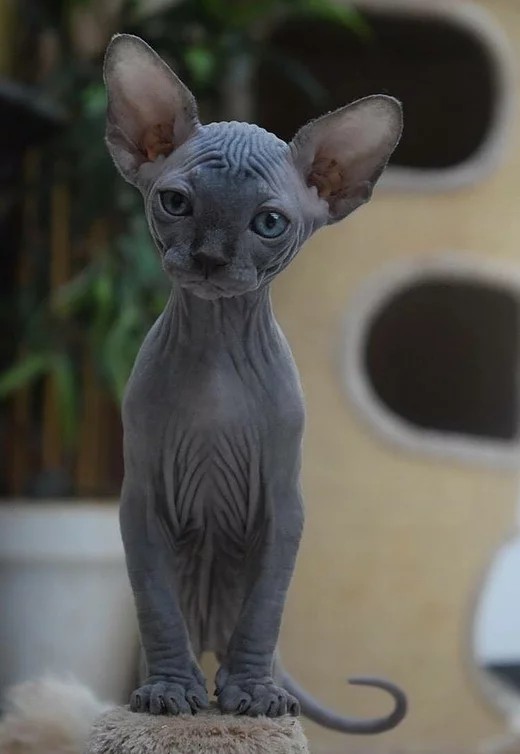Sphynx cat
(Sphynx)

Description
The Sphynx cat is a unique breed known for its distinctive hairless appearance. These cats are friendly, affectionate, and make great companions for people who are looking for a loyal pet. In this article, we will provide a detailed overview of the Sphynx cat breed, including its history, appearance, personality, health, and care. History: The Sphynx cat breed has a relatively short history compared to other cat breeds. The breed was first developed in Canada in the 1960s when a domestic shorthair cat gave birth to a hairless kitten. This kitten was bred with other cats, including Siamese and Devon Rex, to create a new breed of hairless cats. The breed was officially recognized by the Cat Fanciers' Association (CFA) in 1985. Appearance: The most distinctive feature of the Sphynx cat is its lack of fur. The breed has a fine layer of downy hair on its skin, but it is virtually hairless. Sphynx cats come in a variety of colors and patterns, including white, black, blue, red, cream, and tortoiseshell. Sphynx cats have a muscular, medium-sized body with a wedge-shaped head and large, pointed ears. Their eyes are almond-shaped and can be any color, including blue, green, and yellow. Sphynx cats have a long, slender tail and large, round paws. Personality: Sphynx cats are known for their friendly, affectionate personalities. They are social animals and enjoy spending time with their owners. Sphynx cats are also very intelligent and can be trained to do tricks, such as playing fetch or responding to commands. Health: Sphynx cats are generally healthy and have a lifespan of 8-14 years. However, they are prone to certain health issues, including: Hypertrophic cardiomyopathy (HCM) - a heart condition that can lead to heart failure. Dental problems - Sphynx cats are prone to gum disease and tooth decay. Skin issues - Sphynx cats require regular bathing to keep their skin clean and free of oils that can cause skin infections. Respiratory infections - Sphynx cats are susceptible to respiratory infections, such as the common cold. Care: Sphynx cats require special care due to their lack of fur. Here are some tips for caring for your Sphynx cat: Bathing - Sphynx cats require regular bathing to keep their skin clean and free of oils. Use a gentle shampoo and warm water to bathe your cat. Nail trimming - Sphynx cats have sharp claws that need to be trimmed regularly. Use a nail clipper to trim your cat's claws. Dental care - Sphynx cats are prone to dental issues, so it's important to brush their teeth regularly. Sun protection - Sphynx cats are sensitive to the sun and can get sunburned. Keep your cat indoors or provide shade when they are outside. Conclusion: The Sphynx cat is a unique and affectionate breed that makes a great pet for people who are looking for a loyal companion. While they require special care, including regular bathing and nail trimming, the rewards of owning a Sphynx cat are well worth the effort. If you are considering adopting a Sphynx cat, be sure to research the breed and consult with a reputable breeder or veterinarian.
Taxonomic tree:







